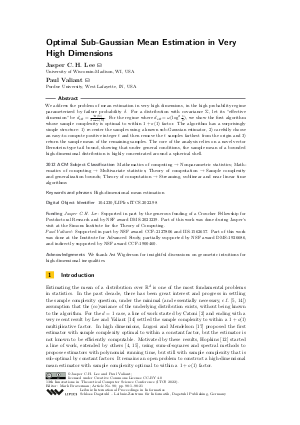Optimal Sub-Gaussian Mean Estimation in Very High Dimensions
Authors Jasper C.H. Lee, Paul Valiant
-
Part of:
Volume:
13th Innovations in Theoretical Computer Science Conference (ITCS 2022)
Part of: Series: Leibniz International Proceedings in Informatics (LIPIcs)
Part of: Conference: Innovations in Theoretical Computer Science Conference (ITCS) - License:
 Creative Commons Attribution 4.0 International license
Creative Commons Attribution 4.0 International license
- Publication Date: 2022-01-25
File

PDF
LIPIcs.ITCS.2022.98.pdf
- Filesize: 0.68 MB
- 21 pages
Document Identifiers
Subject Classification
ACM Subject Classification
- Mathematics of computing → Nonparametric statistics
- Mathematics of computing → Multivariate statistics
- Theory of computation → Sample complexity and generalization bounds
- Theory of computation → Streaming, sublinear and near linear time algorithms
Keywords
- High-dimensional mean estimation
Metrics
- Access Statistics
-
Total Accesses (updated on a weekly basis)
0Document
0Metadata
Abstract
We address the problem of mean estimation in very high dimensions, in the high probability regime parameterized by failure probability δ. For a distribution with covariance Σ, let its "effective dimension" be d_eff = {Tr(Σ)}/{λ_{max}(Σ)}. For the regime where d_eff = ω(log^2 (1/δ)), we show the first algorithm whose sample complexity is optimal to within 1+o(1) factor. The algorithm has a surprisingly simple structure: 1) re-center the samples using a known sub-Gaussian estimator, 2) carefully choose an easy-to-compute positive integer t and then remove the t samples farthest from the origin and 3) return the sample mean of the remaining samples. The core of the analysis relies on a novel vector Bernstein-type tail bound, showing that under general conditions, the sample mean of a bounded high-dimensional distribution is highly concentrated around a spherical shell.
Cite As Get BibTex
Jasper C.H. Lee and Paul Valiant. Optimal Sub-Gaussian Mean Estimation in Very High Dimensions. In 13th Innovations in Theoretical Computer Science Conference (ITCS 2022). Leibniz International Proceedings in Informatics (LIPIcs), Volume 215, pp. 98:1-98:21, Schloss Dagstuhl – Leibniz-Zentrum für Informatik (2022)
https://doi.org/10.4230/LIPIcs.ITCS.2022.98
BibTex
@InProceedings{lee_et_al:LIPIcs.ITCS.2022.98,
author = {Lee, Jasper C.H. and Valiant, Paul},
title = {{Optimal Sub-Gaussian Mean Estimation in Very High Dimensions}},
booktitle = {13th Innovations in Theoretical Computer Science Conference (ITCS 2022)},
pages = {98:1--98:21},
series = {Leibniz International Proceedings in Informatics (LIPIcs)},
ISBN = {978-3-95977-217-4},
ISSN = {1868-8969},
year = {2022},
volume = {215},
editor = {Braverman, Mark},
publisher = {Schloss Dagstuhl -- Leibniz-Zentrum f{\"u}r Informatik},
address = {Dagstuhl, Germany},
URL = {https://drops.dagstuhl.de/entities/document/10.4230/LIPIcs.ITCS.2022.98},
URN = {urn:nbn:de:0030-drops-156942},
doi = {10.4230/LIPIcs.ITCS.2022.98},
annote = {Keywords: High-dimensional mean estimation}
}
Author Details
Funding
- Lee, Jasper C.H.: Supported in part by the generous funding of a Croucher Fellowship for Postdoctoral Research and by NSF award DMS-2023239. Part of this work was done during Jasper’s visit at the Simons Institute for the Theory of Computing.
- Valiant, Paul: Supported in part by NSF award CCF-2127806 and IIS-1562657. Part of this work was done at the Institute for Advanced Study, partially supported by NSF award DMS-1926686, and indirectly supported by NSF award CCF-1900460.
Acknowledgements
We thank Avi Wigderson for insightful discussions on geometric intuitions for high-dimensional inequalities.
References
-
Noga Alon, Yossi Matias, and Mario Szegedy. The space complexity of approximating the frequency moments. J. Comput. Syst. Sci, 58(1):137-147, 1999.

-
Olivier Catoni. Challenging the empirical mean and empirical variance: a deviation study. Ann. I. H. Poincaré -PR, 48(4):1148-1185, 2012.

-
Olivier Catoni and Ilaria Giulini. Dimension-free PAC-Bayesian bounds for the estimation of the mean of a random vector. arXiv:1802.04308, 2018.

-
Yeshwanth Cherapanamjeri, Nicolas Flammarion, and Peter L. Bartlett. Fast mean estimation with sub-Gaussian rates. In Proc. COLT '20, pages 786-806, 2019.

-
Luc Devroye, Matthieu Lerasle, Gabor Lugosi, and Roberto I. Oliveira. Sub-Gaussian mean estimators. Ann. Stat, 44(6):2695-2725, 2016.

-
Luc Devroye, Abbas Mehrabian, and Tommy Reddad. The total variation distance between high-dimensional Gaussians. arXiv:1810.08693, 2020.

-
Ilias Diakonikolas, Gautam Kamath, Daniel Kane, Jerry Li, Ankur Moitra, and Alistair Stewart. Robust estimators in high-dimensions without the computational intractability. SIAM J. Comput., 48(2):742-864, 2019.

-
Ilias Diakonikolas, Gautam Kamath, Daniel M. Kane, Jerry Li, Ankur Moitra, and Alistair Stewart. Being robust (in high dimensions) can be practical. In Proc. ICML'17, pages 999-1008, 2017.

-
Ilias Diakonikolas, Gautam Kamath, Daniel M. Kane, Jerry Li, Ankur Moitra, and Alistair Stewart. Robustly learning a Gaussian: Getting optimal error, efficiently. In Proc. SODA'18, pages 2683-2702, 2018.

-
Ilias Diakonikolas and Daniel Kane. Robust high-dimensional statistics. In Tim Roughgarden, editor, Beyond the Worst-Case Analysis of Algorithms, pages 382-402. Cambridge University Press, 2021.

-
Ilias Diakonikolas, Daniel M. Kane, and Ankit Pensia. Outlier robust mean estimation with subgaussian rates via stability. In Proc. NeuRIPS'20, pages 1830-1840, 2020.

-
Samuel B. Hopkins. Mean estimation with sub-Gaussian rates in polynomial time. Ann. Stat., 48(2):1193-1213, 2020.

-
Mark R. Jerrum, Leslie G. Valiant, and Vijay V. Vazirani. Random generation of combinatorial structures from a uniform distribution. Theor. Comput. Sci, 43:169-188, 1986.

-
Jasper C.H. Lee and Paul Valiant. Optimal sub-Gaussian mean estimation in ℝ. To appear in Proc. FOCS'21.

-
Zhixian Lei, Kyle Luh, Prayaag Venkat, and Fred Zhang. A fast spectral algorithm for mean estimation with sub-Gaussian rates. In Proc. COLT '20, pages 2598-2612, 2020.

-
Gábor Lugosi and Shahar Mendelson. Mean estimation and regression under heavy-tailed distributions - a survey. Found. Comput. Math., 19(5):1145-1190, 2019.

-
Gábor Lugosi and Shahar Mendelson. Sub-Gaussian estimators of the mean of a random vector. Ann. Stat., 47(2):783-794, 2019.

-
Gábor Lugosi and Shahar Mendelson. Robust multivariate mean estimation: the optimality of trimmed mean. Ann. Stat., 49(1):393-410, 2021.

-
Stanislav Minsker. On some extensions of Bernstein’s inequality for self-adjoint operators. Stat. Probab. Lett., 127:111-119, 2017.

-
A.S. Nemirovsky and D.B. Yudin. Problem Complexity and Method Efficiency in Optimization. Wiley, 1983.

-
Roberto I. Oliveira and Paulo Orenstein. The sub-Gaussian property of trimmed means estimators. Technical Report, IMPA, 2019.

-
Joel A. Tropp. An Introduction to Matrix Concentration Inequalities. Foundations and Trends in Machine Learning, 8(1-2):1-230, 2015.

-
V.V. Yurinskiĭ. Exponential inequalities for sums of random vectors. J. Multivar. Anal., 6(4):473-499, 1976.

